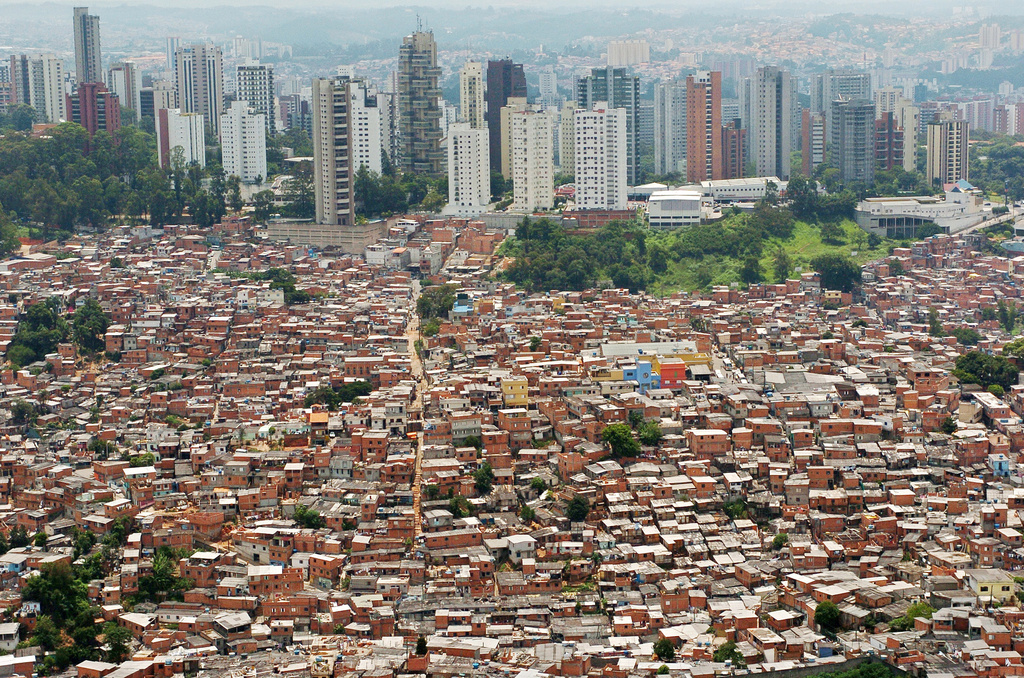Cities see selves as climate change pioneers

Representatives of around 40 of the world’s cities have met in Basel to discuss – for the first time – how they can fight climate change.
Cities use a lot of energy and cause around 70 per cent of the globe’s carbon dioxide emissions. There are plenty of ideas how to tackle these problems – but financing remains a problem.
The goal of the two-day Global Energy Basel (GEB) conference is to help metropoles find investors – also attending – for sustainable infrastructure projects such as energy efficient buildings and transport and the provision of renewable energy supplies.
It follows on from the Cancun climate summit in December which called for a two-degree Celsius limit on global warming. To reach this, cities must reduce their CO2 emissions by 80 per cent, said Guy Morin, Basel’s mayor.
“There are around 40 megacities here and around 300 delegates coming to this conference to meet and discuss our best practices for achieving this goal,” Morin told swissinfo.ch.
Basel’s role
Basel, he said, was an ideal site because it is a pioneer in environmental protection: it is, for example, a leading European Energy City with gold status. Canton Basel City has also been working hard to reduce CO2 emissions.
The GEB, which started on Tuesday, was convened by Morin and the mayor of New York, Michael Bloomberg, who currently holds the chair of the C40 Climate Leadership Group of Large Cities, an climate change alliance including, among others, Mexico City, Jakarta, London and Beijing.
Bloomberg was unable to attend the conference himself, but said in a video message he was glad that so many experts had come together to work on the issue of public and private financing, “which is fundamental to our ability to effect change in each of our urban areas, particularly at a time when budgets are strained”.
Around half of the world’s population lives in cities, with two-thirds of energy being used there, delegates said. As urbanisation is expected to increase in the coming decades, action is crucial, they underlined.
Money, money, money
“In cities around the world there are innovative ideas that are building the modern economy, creating jobs and lowering our impact on the environment,” said David Miller, the former mayor of Toronto and former C40 Chairman, who is now an advisor to the World Bank.
“But we can’t succeed in international goals unless there is proper financing,” he added.
Financing could come from international organisations such as the World Bank, which could move its financing from countries to cities, and the private sector, such as venture capital funds, he told swissinfo.ch.
Toronto has a strategy to meet and even exceed the Kyoto goals on reducing carbon emissions, he said, and wants to create a 120 kilometre-light rail transit system. This was to be funded by the provincial government, but the financial crisis has slowed this down. “We need to find a way to overcome that.”
Sao Paulo, the economic centre of Brazil – and host of the next C40 summit in May – has been showing how developing economies can put innovative ideas into effect, in this case, using two landfill sites.
“These are producing gas and energy sufficient for the consumption of 700,000 people so it’s for us a breakthrough project and a very important one,” Guilherme Mattar, Secretary for International Relations in Sao Paulo, told swissinfo.ch.
The city is also planning an integrated approach to illegal waste disposal in the favelas, the shanty towns. This envisages measures such as environmental education and coordinated waste collection.
Different needs
Delegates were aware that the world’s cities have different needs. Developing economies in particular pose a challenge, which is where the World Bank and the private sector can step in, believes Miller.
“The good news: just as in many countries they went to mobile phones and didn’t need to build infrastructure for traditional phones, we can envisage the same thing about energy,” he said.
“If you don’t have to build up an electricity network perhaps you can go straight to solar and to distributed energy and straight to small scale locally-generated projects. There is financing for that.”
There was optimism that the conference would come up with concrete mechanisms and a clear idea of how to move forward on the climate issue by its close on Wednesday afternoon. Action is needed, delegates warned.
“We are racing against the clock as far as climate change is concerned,” said Mattar.
In a concluding statement, Global Energy Basel said the complexity of investment plans required close collaboration between the financial sector, pension funds, the industry, technology providers, science, civil society and governments of all levels.
In 2005 representatives of 18 world cities signed a communiqué in London recognising the need to take action and to cooperate on reducing climate emissions.
In 2006 the initiative was strengthened when a partnership was announced between the Clinton Climate Initiative and the Large Cities Leadership Group, since renamed C40. This pledged to reduce carbon emissions and to increase energy efficiency in large cities worldwide.
The current C40 chair is Mayor Michael Bloomberg of New York City. The C40 also has 19 affiliate cities (see link).
According to Bloomberg, the C40 cities have 8% of the world’s population, cause 14% of emissions and generate 21% global Gross Domestic Product. More than 400 million people were represented by those attending the GEB.
United Nations talks in Cancun, Mexico in December 2010 managed to reach a deal to curb climate change.
The conference established that deeper cuts in carbon emissions are needed but did not set out a mechanism for achieving pledges.
The deal includes the creation of a Green Climate Fund and steps to help share clean technologies such as wind and solar power, protect tropical forests and assist poor nations to adapt to impacts such as floods, droughts and rising seas levels.

In compliance with the JTI standards
More: SWI swissinfo.ch certified by the Journalism Trust Initiative





You can find an overview of ongoing debates with our journalists here. Please join us!
If you want to start a conversation about a topic raised in this article or want to report factual errors, email us at english@swissinfo.ch.